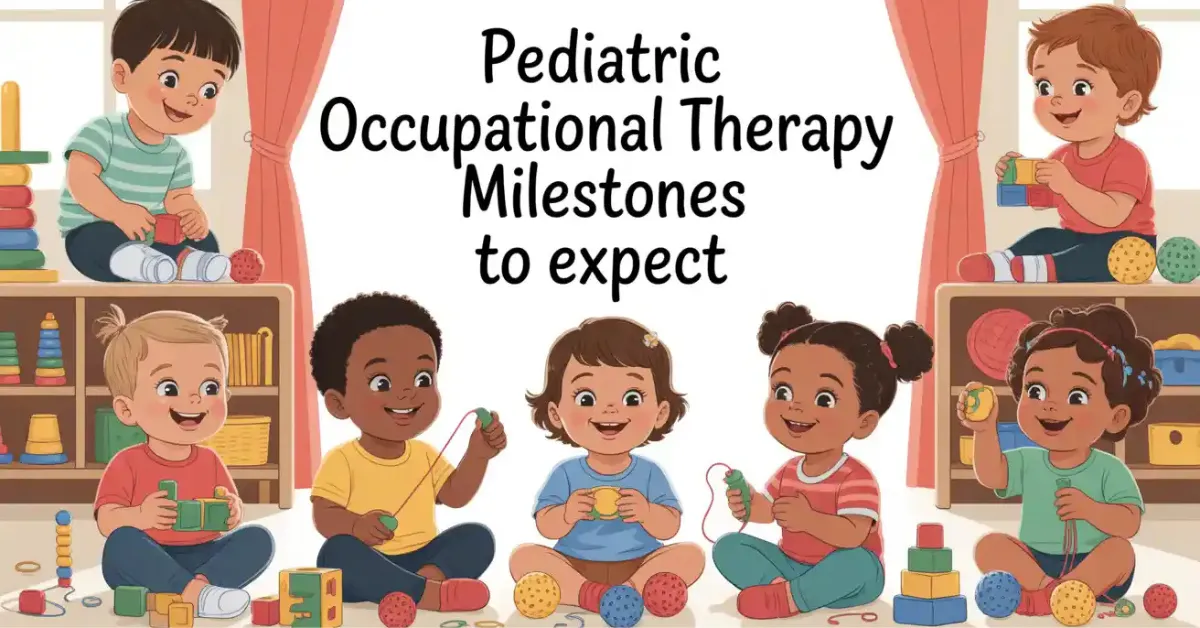When parents first bring their infant for evaluation, many assume development unfolds in predictablesteps, yet what truly matters isn’t whether a child holds a crayon at precisely 18 months or sits independently by 6. Pediatric Occupational Therapy Milestones emerge through how children integrate sensory information while exploring their environment, whether that means a baby reaching for objects during tummy time or a toddler using both hands to manipulate toys at midline. The journey from reflexively grasping at birth to independently writing their name by 5-6 years reflects not rigid timelines but fluid skills shaped by play, social interaction, and each family’s unique rhythm which is why tracking Pediatric Occupational Therapy Milestones helps caregivers recognize when simple activities like banging blocks together or transferring beads from one hand to the other signal emerging motor planning and problem solving capacities.
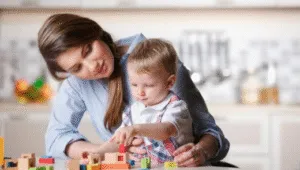
Initial Six Months
- Reaching emerges around the fourth month, transitioning from reflexive movements to intentional visual tracking,during which infants follow objects across their field of vision and begin coordinating hand-eye movements.
- Pediatric Occupational Therapy Milestones. Grasping evolves from palmar reflex responses into voluntary control, where babies bring their hands to their mouths, hold onto toys briefly, and demonstrate early motor coordination through midline orientation.
- Head control strengthens progressively as infants lift their head during tummy time, establishing foundational trunk stability that enables them to roll from back to side and eventually achieve complete rotational movements.
- Sensory exploration intensifies through mouthing objects, responding to different textures, and showing reactions to environmental stimuli while developing body awareness through touch and proprioceptive input.
- Social engagement becomes evident as babies smile responsively, make eye contact, respond to familiar voices, and begin vocalizing during interactions, laying the groundwork for future communication and attachment patterns.
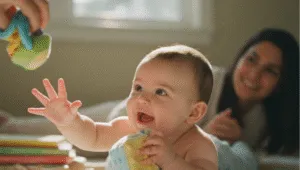
Half-Year to One Year
- Pediatric Occupational Therapy Milestones during this phase, Hands become exploratory tools as fingers develop palmar grasp, transitioning to pincer precision, where transfers of objects between hand movements signal emerging fine motor coordination that pediatrician assessments track through developmental checklist observations.
- Belly time strengthens as infants lying on their stomachs demonstrate propping on extended arms while their shoulders stabilize, eventually roll from back to side, and sitting balance emerges when support decreases, gross motor progress that occupational therapy monitors closely for developmental delay.
- Vocalizes through coos and laughs while facial expressions communicate needs, where bonding deepens as the baby smiles when picked up, cuddles during feeding, and searches for sound sources, speech precursors that the therapist may screen during birth to2-year evaluations.
- Sensorimotor exploration drives learning as the mouth becomes the primary investigator, eyes track moving play items across midline, and imitates simple actions like banging blocks, sensory processing foundations that occupational therapy addresses when families express concerns about response patterns.
- Pleasure surfaces during peek-a-boo games while emerging attachment to caregivers provides security for exploring surroundings, bounces when held in a standing position, and quiets to familiar voices, emotional regulation skills that Virginia early intervention programs evaluate at no cost for toddlers showing atypical patterns.

12-18 Month Period
- Pediatric occupational therapy milestones during this phase track how infants purposefully release objects into containers while demonstrating early radial-digital grasp refinement, a skill that must signal readiness for tool exploration, though parents must remember each child’s timeline varies naturally.
- The transition from lying to sitting unsupported becomes fluid as infants pivot and turn their bodies, eventually standing while holding onto furniture or leaning against something stable before they begin crawling on hands and knees.
- Walks with hand-held assist, demonstrating balance coordination, and enjoys movement activities like spinning and swinging. These vestibular experiences build foundational body awareness for future gross motor challenges.
- Listens to speech patterns and follows one-step directions when called, recognizes familiar words including family member names, uses gestures effectively, looks at pictures in a book, and generalizes previously learned concepts from past experiences.
- Shows dependence through separation and stranger anxiety, will interact briefly with other infants, lifts arms for pickup, engages in sensorimotor play that evolves into functional use, appropriately using objects for their purpose, like placing a toy telephone near their ear while beginning to engage with siblings.
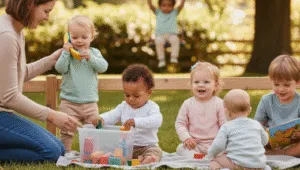
One-and-a-Half to Two Years
- Pediatric Occupational Therapy Milestones during this phase: Walks up stairs with hand-held support while managing messy activities involving sweet and sour sensations, though directed engagement remains self-focused rather than truly collaborative
- Pretend play evolves from simple symbolic gestures using real props like a block as a car to more elaborate pretending sequences where trial and error shape how objects work and function
- Climbs on furniture and pulls up to standing without needing to stabilize against a chair, then squats to pick up items from the floor before pushing forward with large motor confidence
- Recognizes and identifies various body parts, including head and nose,when prompted, demonstrating understanding of spatial relationships between small object manipulation and puzzle attempts that require points at pictures
- Parallel playing alongside a peer not yet interacting or cooperating, though begins to feel secure enough to move away from caregivers into all spaces of a room, where open and closed boxes and containers duringsleep-walk transitions
If your child could benefit from occupational therapy to enhance these Pediatric Occupational Therapy Milestones, early intervention supports functional independence.
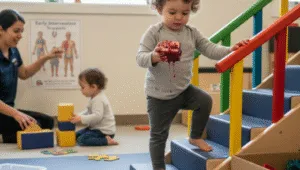
24-36 Month Period
- Pediatric Occupational Therapy Milestones during this phase. Hands become remarkably capable during play sessions—strings of large beads get threaded with surprising focus, toys like building blocks create towers reaching impressive heights, and pages of a book turn with deliberate control while circular scribbles appear everywhere.
- Pulls on pants and removes simple garments independently, takes off shoes after outdoor adventures, holds out arms and legs during dressing routine as a genuine cooperative participant, and puts on simple items while being helped to pull shirts overhead.
- Runs with genuine confidence, jumps in place without toppling, kicks a ball forward with actual aim, climbs up structures with determination, and walks down stairs while gripping railings tightly.
- Completes two-step directions without constant reminding, uses their index finger to poke at screens or push small buttons on toys, and examines objects thoroughly with intense curiosity, showing refined fingertip control.
- Demonstrates growing independence in self-care moments, particularly during toileting attempts where getting on the potty becomes a daily rhythm, though cleaning self still requires assistance, and cooperative play begins emerging with peers during activities—you must celebrate each victory while remaining patient, and these months must mark that crucial period where skills previously requiring help transform into proud solo accomplishments.
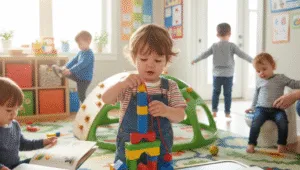
Preschooler (3-4 Years)
- Pediatric Occupational Therapy Milestones during this phase, watch how a child now completes intricate 6-10 block tower constructions while their tripod grasp emerges naturally, though some still prefer quadrupod positioning during pre-writing strokes that create surprisingly accurate vertical and horizontal lines across large surfaces.
- The copies circle skill appears alongside attempts at cross formations, while colors are applied with deliberate effort as they practice attempting to stay within boundaries of simple forms—this period reveals how bilateral coordination supports cut actions with scissors when one hand stabilizes paper during focused work.
- Rides a tricycle with confident pedal motion, catches a ball against their chest rather than with extended arms, jumps from a small step with increasing courage, and begins to hop on one foot while maintaining precarious balance. These motor achievements demonstrate how dynamic movement patterns integrate vestibular feedback.
- Social play transforms as predominantly parallel interactions shift toward associative connections where children participate in similar game activity without direct collaboration, though true cooperative organization remains emerging. They engage with peers by taking turns in group settings while showing interest, yet may act shyly around strangers.
- Imaginative scenarios expand dramatically as they enjoy completing entire scripts during pretend sequences, matches pictures effortlessly, sorts objects by single attribute like shape or color, and displays beginning comprehension of same versus different concepts plays with water, sand, and various textures provide sensory input, though may experience difficulty during transitions, while early skills in working together to achieve common goal emerge alongside cooperative impulses and feeling responses that reflect understanding of basic social expectations.
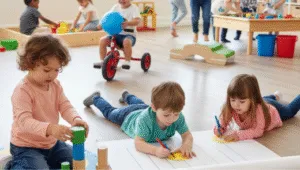
Pre-K (4-5 Years)
- Pediatric Occupational Therapy Milestones during this phase mature tripod grasp on writing utensils like markers and pencils emerges naturally as dexterity refines, allowing children to color within lines with surprising precision while copying shapes such as a circle, square, or triangle during spontaneous activities.
- Pre-writing strokes transition into copying uppercase letters with deliberate effort, and many will attempt the X as their hand coordination strengthens through play that feels challenging yet achievable, building confidence in motor control.
- Cuts along a straight line using scissors and can cut out basic shapes, demonstrating increased in-hand manipulation where fingers move objects from palm to fingertips back again during cutting tasks that require sustained attention.
- Runs, jumps, climbs playground equipment, hops on one leg briefly, walks up and down stairs alternating feet, and can stand balanced for moments, showing how imaginary play fuels physical exploration and body awareness.
- Interest in having friends of the same gender grows as parallel play begins to replace solitary activities, with emerging understanding of social norms like turn-taking during conversation and group games, where categorizing, sorting, and following rules become pathways to connection with playmates and other children.
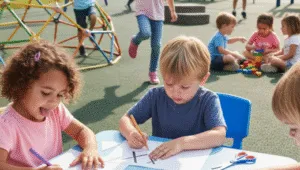
Kindergartener (5-6 Years)
- Bilateral integration strengthens as children cut with scissors while turning paper smoothly with the other hand, demonstrating work across different tasks simultaneously through dynamic coordination.
- Tripod grasp or quadrupod grip emerges naturally when drawing complex shapes like triangles, circles, and squares, while children begin to draw people beyond stick figures, adding copies of their own observations.
- Children string small beads independently, fold and crease paper with precision, perform jumps down from high steps confidently, hit a target when throwing a ball, skip forward, and walk up stairs reciprocally without a rail.
- Understands rules of game play, becoming able to remember instructions with minimal reminding during participation in planning group activity, showing executive function through beginning use of abstract thought and reasoning to solve problems.
- Make stories that involve role-playing with imaginary characters they’ve incorporated, enjoys joking with playful goal-oriented behavior, takes pride in work and belongings, shows interest in goal achievement through dramatic dress, and engages in storytelling, continues to engage in pretend scenarios now with sophisticated imaginary elements through cooperative 2-3 games.
School-Age Children (6-10 Years)
- Pediatric Occupational Therapy Milestones during this Participates in organized games requiring cooperative and competitive interaction while understanding others’ feelings through advanced social reasoning that emerges from deferred imitation, where observed action from a later date informs current game strategy.
- Elaborates imaginary scenarios during dramatic play sessions that reconstruct real-world experiences with increasing accuracy as the child engages in complex problem-solving situations requiring reasoning through problems with long distances of sustained attention beyond earlier developmental stages.
- Demonstrates advanced balance achievements, including standing on one foot for 10 seconds while executing hops, skips with good balance control, catching a ball with refined coordination, and kicking objects toward target destinations with intentional accuracy that reflects mature motor planning.
- Completes complex visual-motor integration tasks involving up to 20-piece puzzles with efficiency, performs copying exercises of most uppercase and lowercase letters with consistent line quality, draws triangle diamond configurations, and cuts along predetermined pathways, including basic shapes like ice cream cone designs with unspecified creative variations.
- Sorts materials by different characteristics in more than one way, showing cognitive flexibility, writes legible text, distinguishing title case formats like John vs JOHN, understands how names such as John appear in various presentations, and executes tasks such as classification tasks, demonstrating mature categorical thinking beyond simple object recognition.
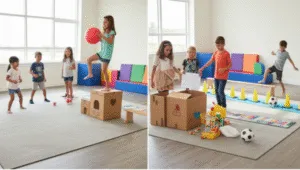
How do professionals monitor age-based developmental progress?
Pediatric Occupational Therapy Milestones emerge through systematic observation where practitioners document how children progress from basic reflexive patterns to sophisticated motor planning capabilities, noting which functional abilities surface during multiple assessment intervals. Rather than following rigid chronological expectations, skilled therapists recognize that each child’s maturation unfolds uniquely. Some demonstrate precision catches earlier, while others excel in abstract reasoning first, yet ALL trajectories reveal good sequential foundations when development advances appropriately, prompting professionals to schedule additional monitoring if concerning gaps appear across a variety of domains.
Conclusion
After years working alongside families, I’ve witnessed how doctor consultations may use specialized tool approaches called developmental screenings, where parents track their baby across four key domains—five if you count language separately and what must strike practitioners must be how these early indicators shape long-term outcomes. From observing tiny hands learning radial digital grasp patterns to watching children master bilateral coordination in crafts, the journey reveals remarkable transformation across sensory systems and motor planning capabilities.
FAQs
Q: When do children typically master the skill of pedaling on ride-on toys?
Between 18-24 MONTHS, toddlers begin experiencing both gross motor coordination and leg strength development. Most achieve ride-on vehicle control around this developmental window, though individual permanence varies significantly.
Q: What fine motor abilities emerge when toddlers can manipulate Play-Doh?
Play-Doh manipulation typically appears alongside squat stability and vertical grasp refinement. Children during this phase also complete multi-step functional tasks requiring bilateral hand coordination.
Q: How does problem-solving complexity change in school-age children?
6-10 YEARS marks when children solve complex problems independently, demonstrating cooperative thinking patterns. They become less impulsive with better emotional regulation, able to demonstrate coping skills effectively.
Q: What precision activities indicate advanced hand-eye coordination development?
Advanced dexterity shows through constructingthree-dimensionalstructures and drawing with accuracy. Children imitating designs while imitating adult models reveal evident fine motor maturation patterns.
Q: When should children show mature throwing mechanics?
Throws with improved speed, endurance, and ball control become evident as trunk rotation integrates. Long distances and target precision develop gradually, requiring flexible shoulder girdle strength.

